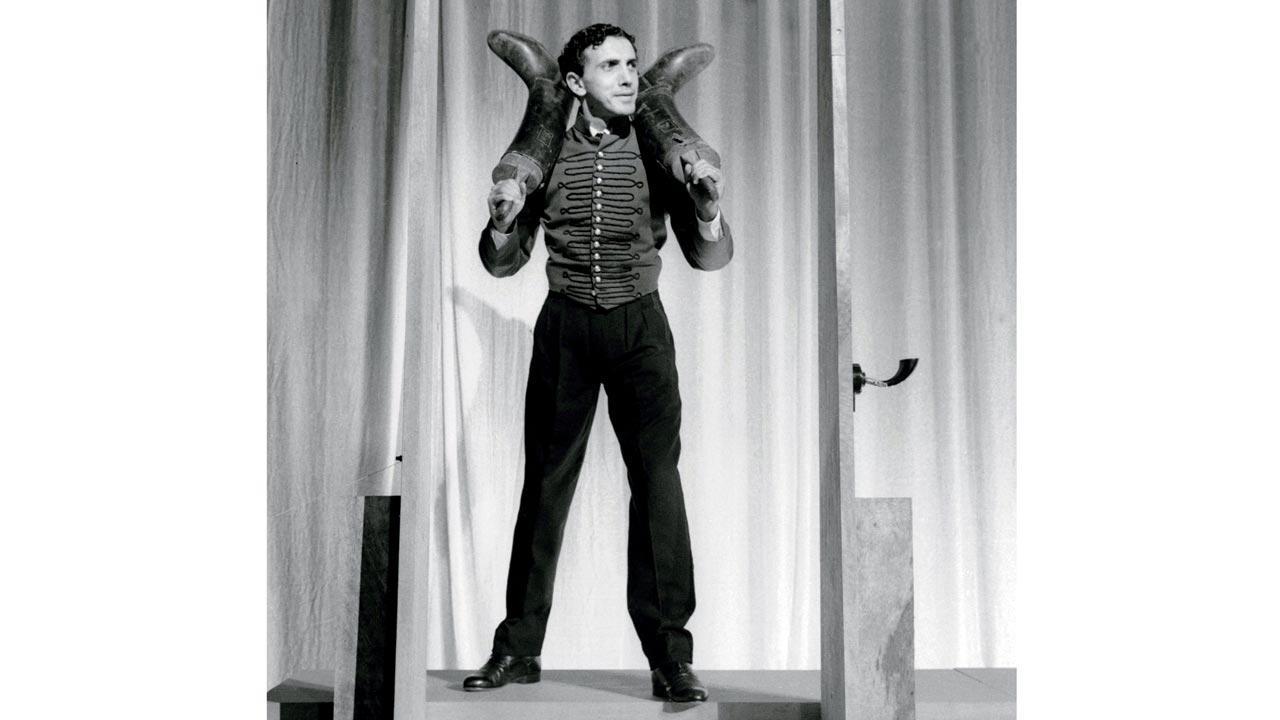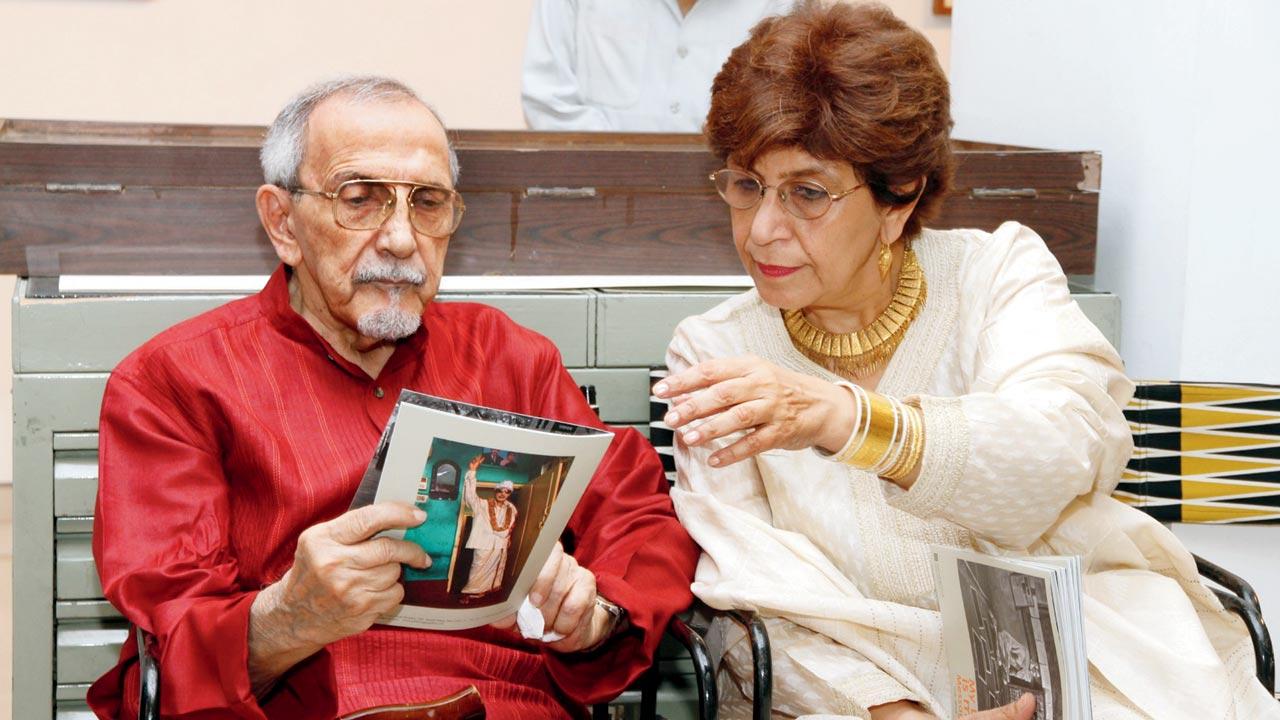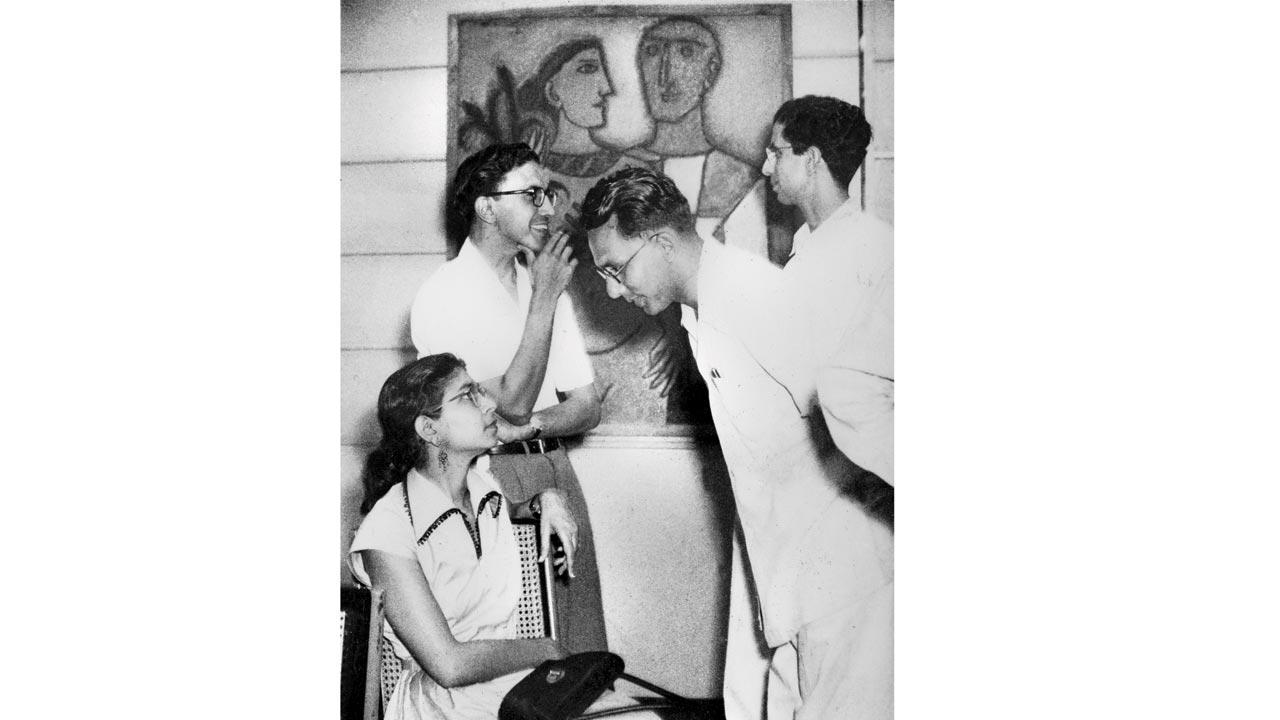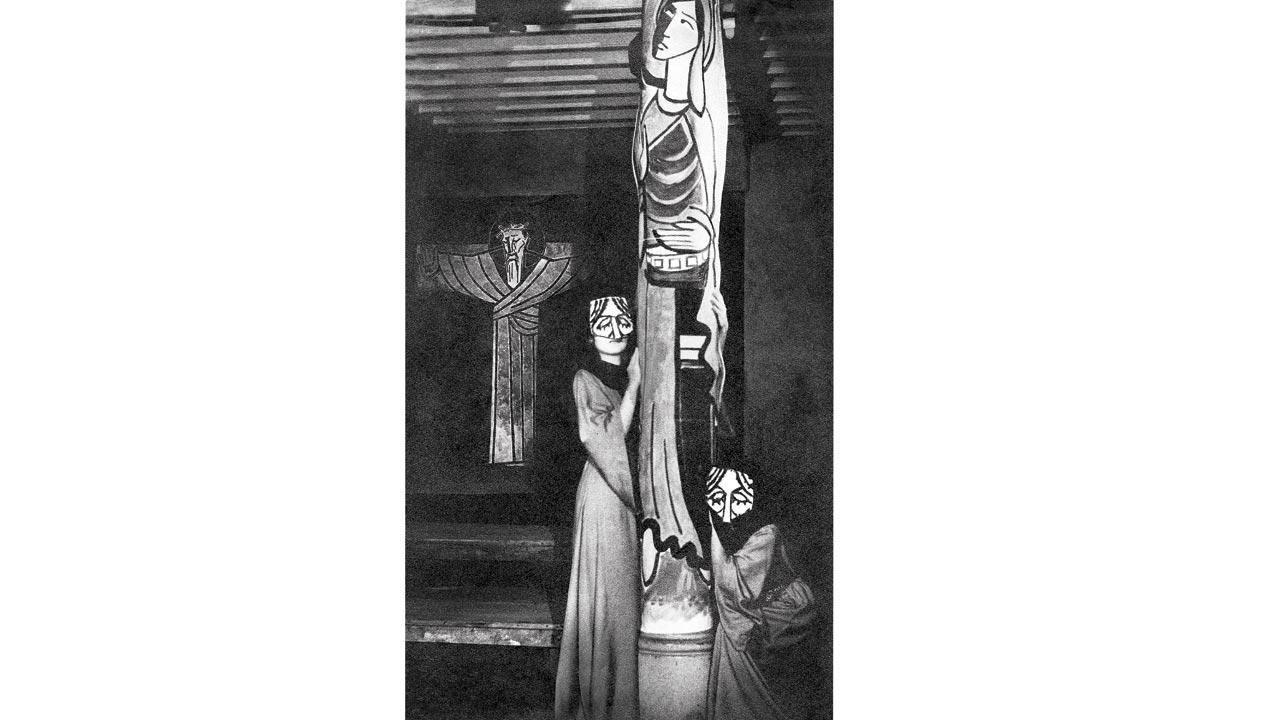Amal Allana’s biography of father Ebrahim Alkazi is an ode to his extraordinary body of work, which he attributes to liberal, cosmopolitan Bombay

Miss Julie by August Strindberg was directed by Alkazi where he acted as Jean. Theatre Unit, Bombay, 1960. Courtesy: Alkazi Theatre Archives
Collegian Ebrahim Alkazi accompanies a fellow passenger on a BEST bus to Gowalia Tank where he is inspired by Mahatma Gandhi’s historic ‘Quit India’ movement call.
At Kala Ghoda’s Chetna restaurant, the hub for intellectual dialogue, Alkazi, Nissim Ezekiel and FN Souza engage in an intense debate about the direction that Bombay theatre is headed towards.
In a tense city post Gandhi’s assassination, Prithviraj, Raj and Shammi Kapoor, Balraj Sahni, Chetan and Dev Anand, spread harmony on an IPTA truck. Urdu writers like Kaifi Azmi, Sahir Ludhianvi, Majrooh Sultanpuri and Ali Sardar Jafri join the procession for peace.
 Ebrahim Alkazi and Amal Allana at Cop Shiva’s show My Life Is My Message, Art Heritage, 2013. Pic Courtesy/Rama Veeresh Babu
Ebrahim Alkazi and Amal Allana at Cop Shiva’s show My Life Is My Message, Art Heritage, 2013. Pic Courtesy/Rama Veeresh Babu
These few mentions from 1940s-50s Bombay appear in the first half of Ebrahim Alkazi: Holding Time Captive (Penguin) authored by Amal Allana. It shines a revelatory light on the city’s culturally-rich, tolerant and cosmopolitan ecosystem which nourished the late theatre veteran’s mind, craft and process; he could express himself freely, and develop a pathbreaking school of thought, supported by guardians who appreciated the literary and performing arts in Bombay. It became the ideal launchpad for his phenomenal rise as one of the founding fathers of the performing arts in independent India.
Edited excerpts from the interview.
Bombay was an exhilarating place for young Ebrahim where he was immersed in idealism and nationalism. How did it influence him, and hold him in good stead for later?
Bombay was fundamental to the shaping of Alkazi’s work and personality. He was a young, energetic adventurer in search of a new world, exciting people, artists and books—all of which he found in Bombay. In fact, I have emphasised its cosmopolitanism in the earlier part of the book, showing the city as welcoming not only of foreign artists and intellectuals from Europe and the USA, but also of Urdu and Hindi writers, and poets from north India— whose ideas fed into the shaping of a new Indian modernity in the arts, that youngsters like Nissim, Souza, Husain, Sultan (Bobby) Padamsee and Alkazi were grappling to come to terms with.
The idea of building and contributing to a new cultural environment was further ignited by a sense of idealism, fostered by men like Gandhi, who provided a humanitarian alternative of resistance in their fight for Independence, in a world that was torn apart by two senseless World Wars.
In the early 1960s, Alkazi relocated to Delhi that he describes as “a cultural desert” compared to Bombay. Delhi excited him too, as it challenged him to culturally build up this barren city into a cultural hub. Alkazi was always alert and sensitive to a city’s cultural needs and responded by evolving projects that contributed to their growth and evolution. Alkazi was a creative but also a concerned citizen.
 It was the love for art that held Roshen and Alkazi’s relationship together. This photo shows the couple with Nissim Ezekiel (right) and HA Gade at the opening of Akbar Padamsee’s solo exhibition, Jehangir Art Gallery, Bombay, 1954. Pic Courtesy/The Alkazi Collection of Art
It was the love for art that held Roshen and Alkazi’s relationship together. This photo shows the couple with Nissim Ezekiel (right) and HA Gade at the opening of Akbar Padamsee’s solo exhibition, Jehangir Art Gallery, Bombay, 1954. Pic Courtesy/The Alkazi Collection of Art
Bobby Padamsee impacted Alkazi’s development as a theatre maker, and vice versa such that he chose Alkazi to take his Theatre Group (TG) forward. Why?
Bobby was Alkazi’s mentor, in every sense. He awakened Alkazi to the interrelationship of the arts, to artistic innovation, a love for poetry, to defining Eastern from Western aesthetics, to the relevance of theatre to society. In Elk (Alkazi), Bobby found an enthusiastic and discerning young man whose innate interest in world theatre and literature was impressive, as were his acting abilities. Also, the fact that despite being from an Arab business family, Elk had taken the bold step of committing himself to marrying Roshen—Bobby’s sister and right hand, in all matters of running a group. This probably led Bobby to believe they would make a strong team. Although Bobby never mentioned it publicly, all TG members veered towards Elk and Roshen taking over TG after Bobby’s passing.
Alkazi bonded with and engaged in constant dialogue with the intellectuals of his time like Nissim Ezekiel and FN Souza…
Both Nissim and Souza had differing personalities. Nissim was quiet and introspective; a loner and thinker. With him Alkazi could share the quieter, more meditative aspects of art and literature. Nissim was not given to voicing his opinions in public stridently. Souza, on the other hand, was volatile and full of himself, undaunted by the impact his words would have on anyone. This did not make Souza insensitive, but outspoken. Alkazi admired this aspect, as he probably didn’t have the ability to confront society in that kind of unrestrained manner. What Souza and Nissim had in common was their unerring honesty. Alkazi regarded Souza as India’s greatest living modern artist.
 MF Husain thanked Elkazi for inviting him to work on the set design for Murder in the Cathedral that he directed. Theatre Group, Bombay, 1953. Pic Courtesy/Alkazi Theatre archives
MF Husain thanked Elkazi for inviting him to work on the set design for Murder in the Cathedral that he directed. Theatre Group, Bombay, 1953. Pic Courtesy/Alkazi Theatre archives
Alkazi was in constant search of his identity. He wrote: Central theme to all great drama is concerned with one question: Who am I? What was the reason for this?
In not moving to Pakistan with his family, in returning to India after his studies in England, Alkazi was consciously or unconsciously, identifying with India. Culture, identity and the question of ‘home’, became deeply disturbing; he felt uneasy as a second-generation migrant, whose father had travelled from Saudi Arabia to settle in Bombay. Alkazi’s entire artistic journey could be described as his ‘discovery of India’. The closest he ever got to identifying himself was when he called himself a “Maharashtrian Arab”! Dr Shreeram Lagoo while awarding Alkazi in Pune, quipped, “It took an Arab to become the Father of Indian Theatre!”
Why did Alkazi believe that theatre education was necessary in India?
English theatre in Bombay in the 1940s and 1950s was a drawing room activity. The professional Urdu, Gujarati and Marathi language theatres had moved out of their commercial rut in Natak companies, and were becoming more experimental in nature. Group theatre was in the making. Finding a lack of direction in theatre activities as a whole, Alkazi felt the need to train himself professionally in England (Royal Academy of Dramatic Art) in the theatre arts and equip himself to return and teach. Within the first two years of his return, he had devised three courses in theatre education for Theatre Group members. By 1955, he had set up The School of Dramatic Arts for the Theatre Unit, offering a one-year integrated course in theatre studies. His students include Satyadev Dubey, Vijaya Mehta, Alaknanda Samarth, and Kusum Behl, among others
 Subscribe today by clicking the link and stay updated with the latest news!" Click here!
Subscribe today by clicking the link and stay updated with the latest news!" Click here!








